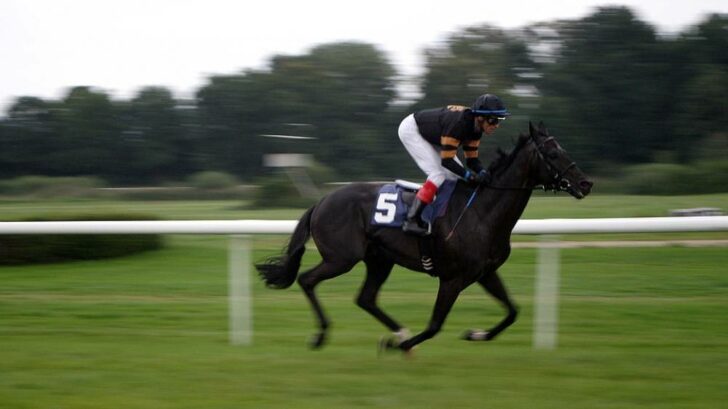Horse Jockeys – A Short Career With Little Money Or Glamour

Things You Never Knew About Horse Jockeys
It’s not surprising that many people regard jockeys as nothing more than underweight midgets, whose job is to whip horses around a racetrack. But in reality, there’s so much more to being a horse jockey than meets the eye. If you watch them racing around the track, either on TV or in person, then they do make winning races look easy. But you could say the same for any winning sports person in their sport of choice. Before you go online to a sportsbook like 22Bet Sportsbook, we thought we’d take a look into the world of horse jockeys and list some factors that people are unaware of.
There Is No Maximum Height For Horse Jockeys
What is rather surprising is that there’s no rule that says how tall or short a jockey can be. Throughout the history of horse racing, height is not a consideration, only weight. Providing they’re to make the allotted weight level for the horse that they’re going to ride, then it’s all good. Of course, In spite of the fact, that there’s no upper limit in terms of the jockey’s height, it’s a given that the taller the jockey, then the more they’re likely to weigh.
The Short Career Of A Six Foot Jockey
A good example of this would be the two-time Irish champion jockey, Donnacha O’Brien. Being slightly over 6-ft tall, he was struggling to maintain his weight, In fact, he stopped riding when he was just 21. Coming from a famous horse racing family, with his father Aiden and older brother Joseph, he was to follow in their footsteps and become a racehorse trainer. With weight constraints in mind, you’ll find that the average height of a jockey is between 4 ft 10 in and 5 ft 6 in. Though it’s true that the majority of jockeys are relatively short, they still need to be strong, as controlling a galloping horse is no easy feat.
Jockeys Must Weigh A Certain Amount

On the whole, you’ll find it’s the conditions of the race that determine how much a jockey needs to weigh. Much will depend on if the horse may be running with a handicap. In such cases, the calculations for the jockey’s weight are relative to the other runners taking part. With handicapping, the top-rated horses will carry the heaviest weight. Keep in mind that it’s bad news if the jockey weighs in “light” after a race, Then they can’t be disqualified. It’s not just the jockey’s weight, but also the horse’s saddle, bridal, and cloth. He must carry these into the weighing room, to weigh as one. If a jockey is found to be overweight, then that’s not a problem.
Check out 22BET’s Betting Markets if You are Looking for Something Special
Weight Allowances For Jockeys
There are allowances that both amateur and professional jockeys can claim off their set weight. These start out at 4.5 kg and get reduced in intervals after a certain number of wins. So once the jockey has managed to claim 75 victories, then jump horse jockeys are said to have “ridden out their claim” and they no longer need to take the additional weight off their mount’s back. Flat racing, allows apprentice jockeys a total of 95 winners. Female riders can claim a more generous allowance in France. In truth, this actually gives them an advantage over their male counterparts.
If you’re going to be betting on the horses, then before you claim a racehorse, it’s really important to understand weight allowances. This is the type of knowledge that could give you an edge over the sportsbooks. And increase your jackpot winning chances at the race track.
Horse Jockeys Get Less Than 10 Percent Of Winnings
When you consider just how dangerous horse racing is, then you’d be surprised to learn that jockeys are not exactly well compensated. Race jumps are probably riskier than running on the flat. For these, the winner normally received between 8 to 9% of the prize money. In truth, that’s not much more than the racehorse trainer. Keep in mind that it’s the owners who pocket the lion’s share, taking around 80% of the winnings. As a result, many jockeys, trainers and grooms will rely on the generosity of the owners to give them a bonus. When it comes to flat racing, the winning prize for the jockey is probably less than 7%. If a rider manages to place in the top three, then this percentage goes down to a measly 3.5%.
Little Money As A Motivation To Do Better

You could argue that with such low numbers, jockeys will have much greater motivation to try and win. Also remember that professional jockeys still need to pay income tax, as well as other expenses, which include such things as agent’s fees. That’s why, compared to many other sports, jockeys are not that well off. Especially when you consider how they risk life and limb with every race.
A Jockey’s Use Of The Whip Has Strict Limits
The whipping of horses during races has long been a controversial topic. In the 21st century, many people are aware of animal welfare and take a dim view of whipping horses as they race. In truth, they take a dim view of all horse racing by default. As a result, there are now clear rules which all jockeys must follow. If any jockey is found to be breaking them, will face severe sanction. When taking part in a flat race, then he can’t use the whip more than seven times. If they do, they will receive a serious fine or could even face suspension. The race stewards are also looking at the force with which the jockey uses the whip. To that end, over-using whips are not the best jackpot winning strategies to use in the long haul.
You Can’t Whip The Horse’s Flanks
When it comes to jumping races, the maximum limit for using the whip is just eight times. The jockey can only use it on the horse’s hind quarters, not by striking the horse’s flanks. Otherwise, expect its use to come with severe penalties. Finally, we should mention that if the horse doesn’t respond to the whip, then the jockey just has to do what he can without its use.
Horse Jockeys Cannot Place Bets

In a similar vein to virtually all professional sports, jockeys cannot place bets. The horse racing authorities take a very dim view of any jockey’s having a flutter at the bookmaker. The general view is that it’s a major breach of the rules. Penalties include such things as lengthy bans and even the loss of their horse racing license. For example, Haley Turner was suspended for 3 months when it was discovered that she was betting on her own races. In truth, this was an incredibly mild punishment. In Australia for example, there’s a mandatory two-year ban if any jockey is betting on themselves.
Jockeys Have Insider Information
We think this is a great rule. Having a stronger punishment should act as a better deterrent. In New South Wales, the jockey Adam Hyeronimus saw a ban for three years when it was discovered he placed two A$500 bets that backed himself, hoping to win the jackpot online. We think these rules are perfectly fair. As it needs to be considered that horse jockeys technically have inside information that can affect the betting and odds. Talking of which, get yourself over to 22Bet Sportsbook for some of the industry’s best odds and types of horse racing bets. They also give all new bettors a generous welcome bonus of 122% up to €100 just for signing up!
You Won’t See Many Horse Jockeys Over 40
In general, most people find it harder and harder to control that weight as they age. When it comes to horse racing jockeys, you’ll find the majority of them end their careers in the saddle at around the age of 40. Having said that, there are some riders who go past 50, but this is the exception to the rule. For example, the British flat jockey Leicester Piggott, finally ended his career at the age of 54. The American horse racing rider, Bill Shoemaker, had his final win in the saddle at 58 years old.
But these are exceptions to the rule. The vast majority of jockeys tend to end their careers in their late 30s or early 40s. Today you can still find riders like Mike Smith from America and Japan’s Yutaka Take. Then there’s the famous Frankie Dettori, still swinging their legs over their mounts well into their 50s.
Click here to visit the 22BET Sportsbook














